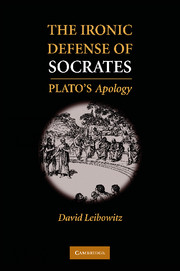Book contents
- Frontmatter
- Contents
- Acknowledgments
- Introduction
- 1 Title and Preliminary Considerations
- 2 Prooemium (17a1–18a6)
- 3 Prothesis (18a7–19a7)
- 4 Defense against the Charges of the First Accusers (19a8–24b2)
- 5 Defense against the Present Accusers (24b3–28b2)
- 6 Second Digression (28b3–34b5)
- 7 Epilogue (34b6–35d8)
- 8 Penalty Section (35e1–38b9)
- 9 Final Speech (38c1–42a5)
- 10 Conclusion
- Short Titles
- Bibliography
- Index
5 - Defense against the Present Accusers (24b3–28b2)
Published online by Cambridge University Press: 05 August 2011
- Frontmatter
- Contents
- Acknowledgments
- Introduction
- 1 Title and Preliminary Considerations
- 2 Prooemium (17a1–18a6)
- 3 Prothesis (18a7–19a7)
- 4 Defense against the Charges of the First Accusers (19a8–24b2)
- 5 Defense against the Present Accusers (24b3–28b2)
- 6 Second Digression (28b3–34b5)
- 7 Epilogue (34b6–35d8)
- 8 Penalty Section (35e1–38b9)
- 9 Final Speech (38c1–42a5)
- 10 Conclusion
- Short Titles
- Bibliography
- Index
Summary
Refutation of the Corruption Charge (24b3–26b2)
Statement of the Charge
In defending himself against the charges of the first accusers, Socrates told us that he had refuted politicians, poets, and craftsmen but provided no examples of the characteristic errors he encountered. He now begins to correct this omission. In what Socrates describes as an attempt to defend himself against the present accusers (not their charges), he cross-examines and refutes the poet Meletus, who calls himself “good and patriotic,” or as we might say, noble and good (cf. 18a7–b1 and 24b3–4 with b4–6; on “attempt” see 20d2–4, 21c7–8).His effort to display Meletus' “pretense” to care sufficiently about, or to know, the matters concerning which he brings charges – and hence his unworthiness to bring them – shows us comically and obliquely some of what he found (23b6–7, 23d8–9, 24c4–9, 24d4, 24d7–9, 25c1–4, 26a8–b2).
Socrates begins by stating not the charge of the present accusers but something akin to their charge: “It is,” he says, “something like this: Socrates does injustice by corrupting the young, and by not believing in the gods in whom the city believes, but in other daimonia (daimonic things) that are new. The charge is of this sort” (24b8–c2). The actual charge, as preserved in Diogenes Laertius, reads: “Socrates does injustice by not believing in the gods in whom the city believes, and by introducing other daimonia that are new; he also does injustice by corrupting the young” (2.40). Socrates has made two principal changes.
- Type
- Chapter
- Information
- The Ironic Defense of SocratesPlato's Apology, pp. 116 - 136Publisher: Cambridge University PressPrint publication year: 2010



